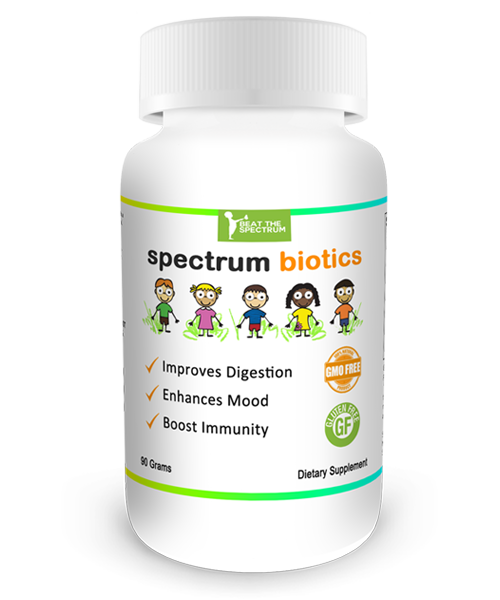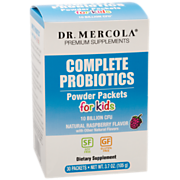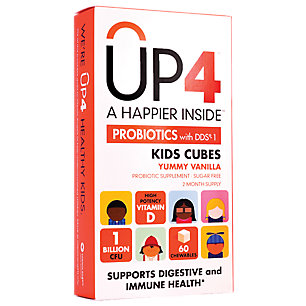You want to try probiotics for your child, do you know which one?
A child’s illness can push a working parent to the point of panic and stress levels can spike when caring for an ill child, so we want to do everything is possible to keep our kids healthy. You probably heard many times that digestive issues can cause various of behavioral problems, as well poor appetite and malabsorption issues! Its vital to support your kids digestive system on a daily basis , so their guts can use all the help they can get , especially these days, when environmental factors effects child’s digestion, and slows natural healthy development. GI system plays a central role in immune system homeostasis, that’s why its important to keep child’s digestive tract under balanced control and support it with probiotics supplement. The proper probiotic plan can significantly improve the quality of life for little individuals. Research shows giving good dosage of good bacteria to kids can:
1. Improve digestion*
2. Help boost vitamins, such as biotin (B-vitamin)*
3. Restore the proper microorganism flora, supports regular bowel movement*
4. Supports immune function, cognitive function and optimizing levels of vitamins and minerals.*
5. Can also be beneficial for kids who have acidic reflux*
One of the most important factors to choosing a product is a combination of strains selected, how they are encapsulated, culture size, and the duration probiotics remain viable.
Everyone states they have the best probiotic, but how do you know can you tell?
It takes couple of seconds to type probiotics and see hundreds of brands online, claiming to fight bad bacteria and support digestive health, but once you start carefully analyze each product, all have different type and amount of strains, ingredients and even different suggestions how to take it and when to take it. The only way to find the one that actually would work for your child is to sort through all the information, read labels and analyze ingredients, reviews and external research. Companies know this would take a lot of Time, Research and Dedication and that most likely you wouldn’t want to do it , so they feel free to make exaggerated claims and promises in order to make you believe they have the best product for your child. Well, that’s why we are here to help you.
The quality of probiotics will depend on important aspects:
1. How the manufacture keeps them? - The moisture and oxygen level must be at a very low level during manufacture and inside the bottle when the product is sealed.
2. What type of strains to choose? – scientists suggest choosing multiple strains probiotic, while having many strains is great, you need to make sure it has the ones that are stomach acid resistant and ones that studies show to have real benefit for kids health, so species and strains are important, different strains provide different benefits, some provide 0 benefits, so you want to make sure it contains the most essential, stable and effective strains of probiotics, for example: Bacillus Subtilis – one of the most important strain, that is an extremely resistant strain that supports intestinal immune-system development and it is commonly used after antibiotic treatments. Lactobacillus Plantarum - supports the digestive system, cognitive function and optimizing levels of vitamins and minerals.
3. What do you need to know about the storage?- Label should also include the following information: storage information as we know probiotics must be kept away from moisture and heat, so keep probiotic refrigerated or in a cool place.
4. Does the bottle need to be more resistant to light or temperature? – Yes, HDPE (high-density polyethylene) and dark-glass bottles are more resistant to heat, HDPE is also known for its anti-corrosive properties, also HDPE is BPA free.
5. Do you know that some probiotic might not be viable at time of manufacture? - it means everything in it could be dead by the time it consumed, so make sure it says on the label it says “viable at time of manufacture” so your child gets a full and potent dose before the “best by” date and the last thing is you want to make sure it has been tested by independent third party.
6. How about kids who has lactose intolerance? - Lactobacillus bulgaricus, Lactobacillus acidophilus and Streptococcus thermophilus provides the enzyme lactase that may help the gut digest and absorb lactose, also there are great probiotic supplements that are also vegan.
7. High-quality product should be free from dangerous fillers, starch, wheat, gluten, soy, milk, egg, or preservatives, harmful chemicals and heavy metals, as we do not want to load more of those to the bodies of our kids!
Why most probiotic supplements don’t work for your child?
Many companies may not be offering you poor quality probiotics, they simply are not fully aware of which kind of strains actually brings the most results, also our stomach is filled with acids that quickly break down whatever we ingest, that’s why acid resistant strains are necessary, also some probiotics supplement contain bacteria that are not in the Bifidobacteria, Lactobacillus, E. coli, and Streptococcus genus because they might not be bacteria that have been studied to be normal human gut flora. We also see a lot of products that include many unnecessary types of filler, some of them are ok , but definitely avoid supplements with artificial coloring (inks.), sugar and preservatives, even if your child loves the tastes, as it might cause more harm and actually feed the bacteria overgrowth, that we are trying to fight so hard.
That’s is why we’ve decided to research and review some of the easily available Probiotic companies out there, and recommend the 3 we believe to be good, as well as help you understand why we chose them.*

SpectrumBiotics
By Cellular Research Institute
#1 – Spectrum Biotics is our top recommendation for 2016 for children and teens.
This is excellent probiotic blend for kids, research behind strains indicates it is helpfull with with digestive issues, malabsorption issues, immune imbalance, allergies and food sensitivities. It contains 8 of the top studied and research backed strains of probiotics. Spectrumbiotics is 15 billion CFU's and is designed to be stable and acid resistant, thus allowing the probiotics to reach the small intestine where they have the most affect.
This product is gluten free, vegan and is free from dangerous and unhealthy chemicals and additives, and is made here in the United States in a FDA registered facility.
Cons:Goes Out of Stock, and is on back ordered frequently.
Return PolicyReturns accepted ,within 90 days even if opened.

Complete Probiotics for Kids 33 MG - NATURAL RASPBERRY
By Dr. Mercola Premium Supplements
Helps maintain a healthy balance of intestinal microflora , assists in food digestion and supports immune health. The company provides single serve packets to support the digestive health of active children on the go, ages 4 and up, tastes good for kids and contains strains of probiotics that resist stomach acid. It is 2 choice and is great for active kids .
Cons:Contains Sodium and Silicon Dioxide, also doesn’t indicate if its GMO or NON-GMO.
Return PolicyReturns accepted within 30 days, must be unopened.

UP4 Kids Cubes 1 BILLION
By U.A.S. Laboratories
UP4 Kids Cubes 1 BILLION - Is our # 3 choice for children and teens. This product contains 60 chewable cubes, that tastes good for kids and convenient to give to an active child. Preservative free and sugar free, contains vitamin D 3.
Cons:
Contains maltitol and palm oil, also Skim Milk Powder ( might not be a good supplement for kids with lactose intolerance)
Return PolicyReturns accepted within 30 days, must be unopened.
*Results may vary based on the individual. This report is created based on research, customer reviews, and clinical studies reviewed by the editors. Additional information can be found in the "Disclosure" and the "Research" section of Herbalistreport.
